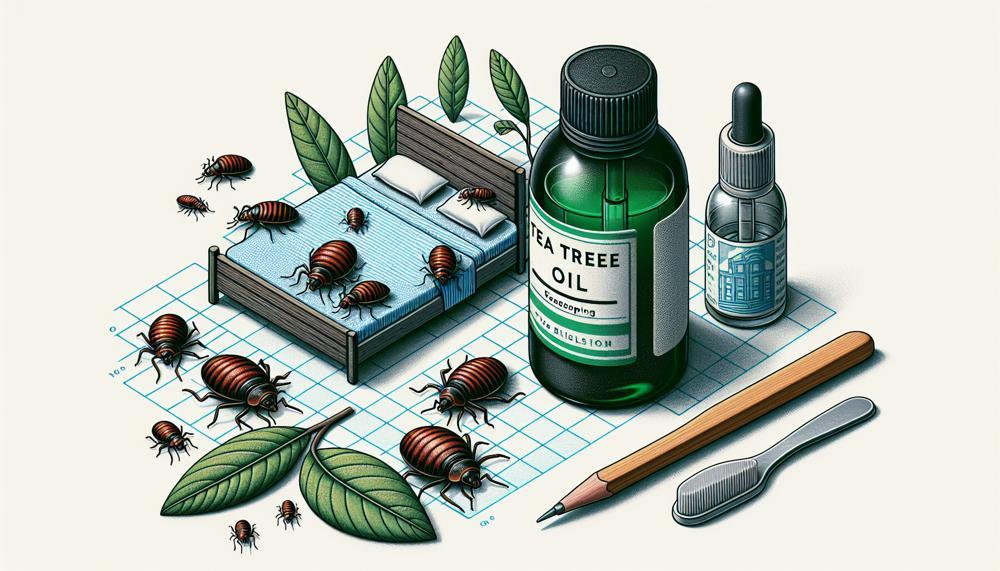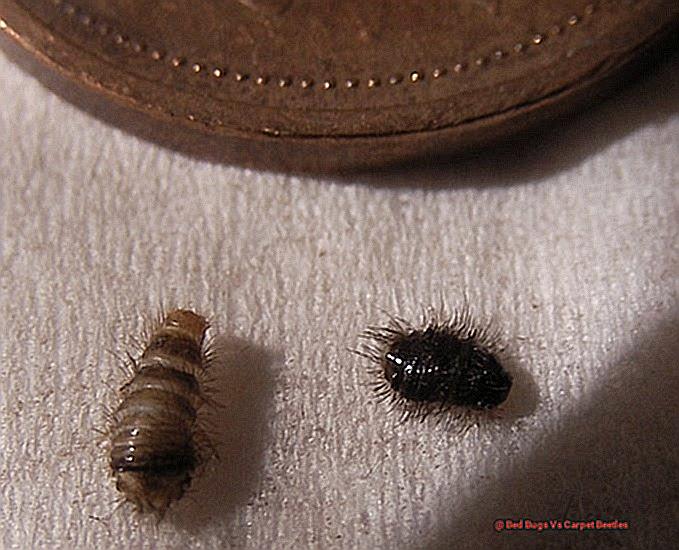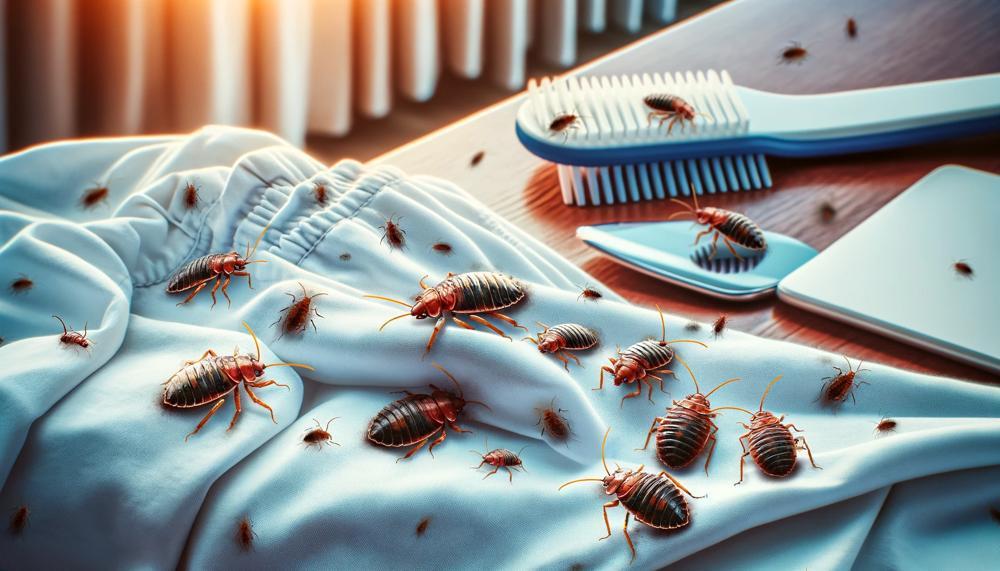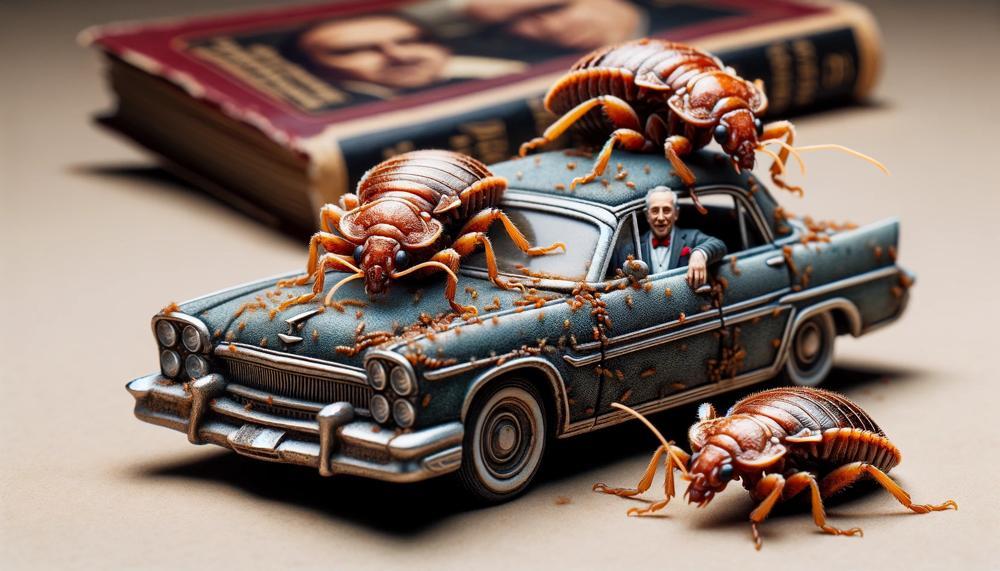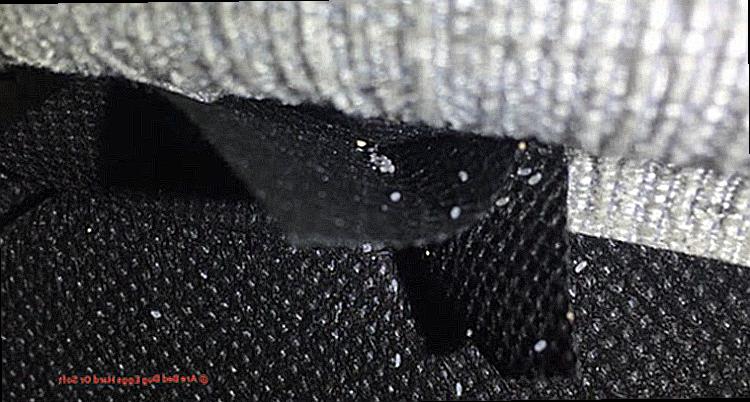Imagine this: you’re cozied up in your bed, ready to drift off into a peaceful slumber.
But suddenly, you feel an unfamiliar sensation on your skin. You scratch at it, thinking it’s just a minor itch, but then you see it—a tiny bed bug scurrying across your sheets.
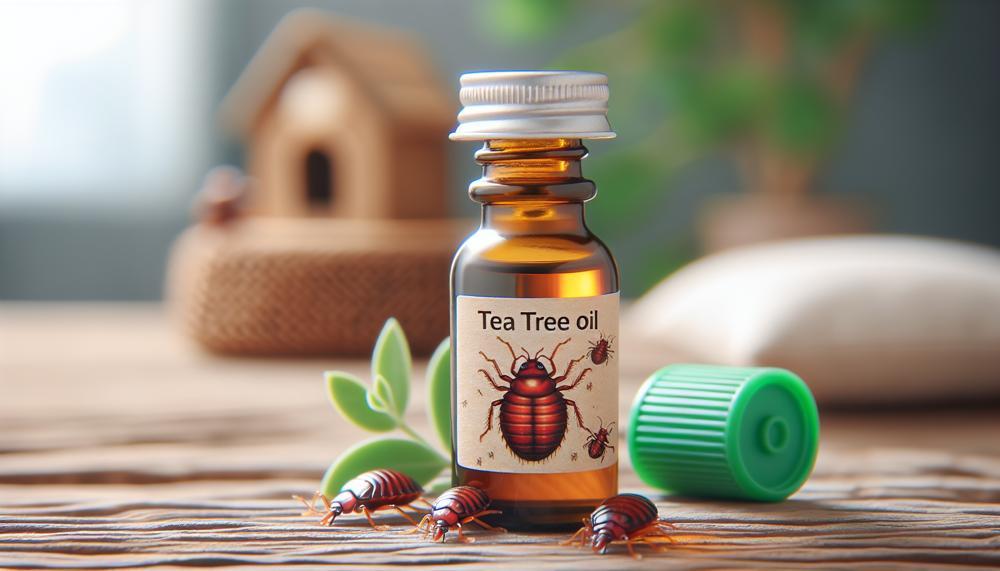
The mere thought of these blood-sucking pests invading your personal space is enough to make anyone’s skin crawl. But fear not, because there may be a natural solution to repel these pesky creatures: tea tree oil.
So, let’s delve into the science behind this claim and discover if tea tree oil truly holds the key to banishing bed bugs from our homes.
Table of Contents
What is Tea Tree Oil?
Tea tree oil, derived from the Melaleuca alternifolia plant, has been used for centuries for its medicinal and insecticidal properties. This powerful oil has gained popularity as a natural remedy for various health issues, including skin conditions and insect infestations.
The use of tea tree oil as an insect repellent has become increasingly popular. Its ability to penetrate the exoskeleton of insects and suffocate them makes it a potent solution against flies, ants, mosquitoes, lice, and other pests. But how exactly does it work?
The secret lies in tea tree oil’s compounds called terpenes, which have insecticidal properties. These compounds can disrupt the nervous systems of insects when applied topically, leading to their demise. Furthermore, the strong scent of tea tree oil can also act as a natural deterrent.
There are several ways to use tea tree oil as an insect repellent. It can be applied directly to the skin or clothing by diluting it with a carrier oil or using it undiluted. You can also use it to clean household surfaces to prevent insect infestations.
However, it’s essential to note that tea tree oil may not be effective enough to eliminate severe infestations of pests like bed bugs. These stubborn insects can hide in small cracks and crevices, making it difficult to reach them with just a spray of tea tree oil.
In such cases, a combination of DIY methods and professional assistance is recommended for complete eradication. DIY methods like vacuuming and diatomaceous earth may help reduce the severity of the infestation, while seeking professional help can ensure complete elimination.
Other effective solutions for eliminating bed bugs include high-heat drying, steam cleaning, freezing items, and using monitoring devices. It’s crucial to keep in mind that tea tree oil can be harmful to humans and may cause skin allergies in some individuals.
Does tea tree oil repel bed bugs?
Yes, tea tree oil can keep bed bugs away. an insecticide that doesn’t harm plants or animals; it kills bacteria, germs, and inflammation.
You can keep bed bugs away with tea tree oil by:
- Mix some water with a few drops of tea tree oil.
- Spray the mixture directly on places where bugs are living, like on beds, furniture, or in cracks and crevices.
Why Are Bed Bugs Such a Big Problem?
These bothersome insects have the ability to swiftly infest a home and become a nightmare to eradicate. But what exactly makes bed bugs such a formidable problem? In this post, we will delve into the intricacies of these pests and explore the various factors that contribute to their prevalence in homes.
Hitchhiking Habits
One of the primary reasons why bed bugs are such a prevalent issue is due to their hitchhiking tendencies. These pests are skilled at catching a ride and can effortlessly travel from one place to another on clothing, luggage, or furniture. This makes it effortless for them to disperse and infest new areas, making containment and elimination a daunting task.
Adaptability
Another critical factor in the widespread presence of bed bugs is their adaptability. These hardy insects can endure a vast range of temperatures and environments, allowing them to thrive in various settings. This adaptability also renders traditional methods of pest control ineffective, making it challenging for homeowners to completely eradicate them.
Mastery of Concealment
Bed bugs possess a small and flat physique, enabling them to conceal themselves in cracks and crevices, making detection arduous. Additionally, they are nocturnal creatures, meaning they are most active at night when their human hosts are asleep. This makes it even more difficult to identify an infestation until it has escalated into a significant problem.
Resistance to Insecticides
Overuse of insecticides has caused bed bugs to develop genetic mutations that make them impervious to many commonly used chemicals. This resistance poses a considerable obstacle to eliminating these pests as conventional methods may prove futile.
Rapid Reproduction Rate
Bed bugs boast a high reproductive rate, with females laying up to 5 eggs per day. This means that within a short period, a few bed bugs can rapidly multiply into a full-blown infestation with hundreds or even thousands of individuals. This swift reproduction rate makes complete eradication a challenging feat, as some eggs may remain hidden and hatch later on.
Difficulty in Detection and Elimination
The secretive behavior of bed bugs and their adeptness at spreading make it problematic for homeowners to eliminate them independently. Many individuals may not even realize they have a bed bug infestation until it has burgeoned into a significant issue.
Are There Better Options to Repel Bed Bugs?
While many resort to chemical-based insecticides as a quick fix, such products often contain harmful chemicals that pose a threat not only to humans but also to the environment.
There are efficient alternatives to chemical-based insecticides that can repel bed bugs without compromising safety or the environment. Let us delve into these options in detail:
Essential Oils
An increasingly popular alternative to chemical-based insecticides is essential oils. Among these, tea tree oil, in particular, has been shown to be an effective contact insecticide and repellent for bed bugs due to its potent scent. Other essential oils, such as lavender, clove, peppermint, eucalyptus, cinnamon, and thyme, also have similar effects on bed bugs.
For a more powerful effect, these oils can be combined together. However, take note that tea tree oil has a strong aroma that may not be pleasing to some individuals. In such cases, it can be mixed with lavender for a more pleasant fragrance.
Vacuuming and Steam Cleaning
Bed bugs are adept at hiding in cracks and crevices, making it challenging to eradicate them completely. Regular vacuuming and steam cleaning can help eliminate these pests from their hiding spots, thereby reducing their population. Be sure to use a vacuum with a HEPA filter and a steam cleaner with high heat settings for optimal results.
Hot Washing and Drying
Bed bugs cannot survive extreme temperatures; hence, hot washing and drying your bedding and clothes can effectively kill these pests. Remember to use the highest heat settings for at least 30 minutes to ensure complete eradication of bed bugs.
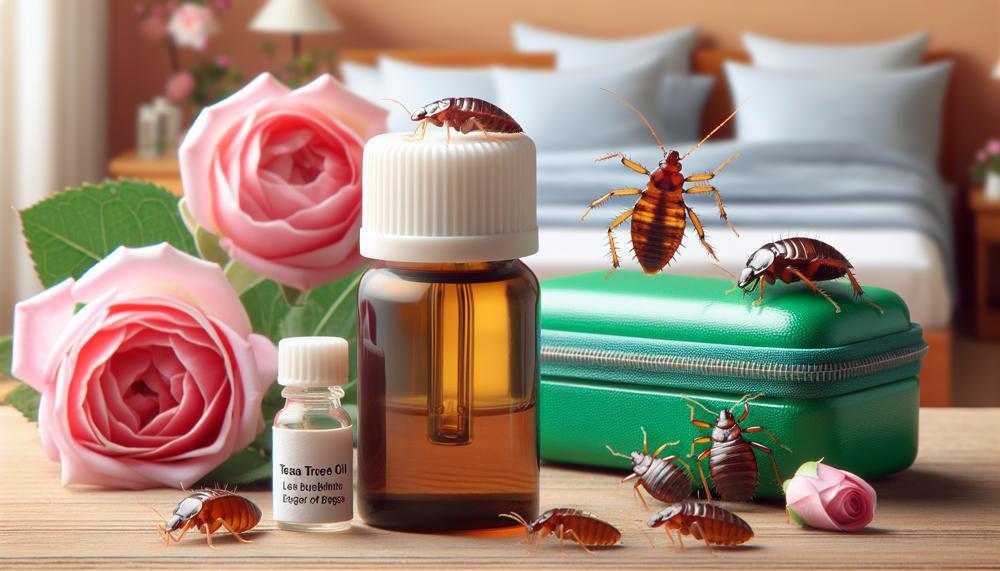
Traps
Trapping bed bugs with double-sided tape is another efficient method for controlling and preventing infestations. Simply place the tape around the legs of your bed and other furniture, and the sticky surface will capture any bed bugs attempting to climb up.
Numerous effective alternatives to chemical-based insecticides exist for repelling bed bugs. Essential oils, regular vacuuming and steam cleaning, hot washing and drying, and traps are all effective methods that can help control and prevent bed bug infestations without harming your health or the environment.
Tea Tree Oil for Bed Bugs: Is It Really Efficient?
Tea tree oil is a renowned natural remedy for repelling pesky bed bugs. But is it truly efficient? Let us delve into the most effective method of using tea tree oil against these blood-sucking creatures and why it may not be as foolproof as believed.
The recommended approach for using tea tree oil against bed bugs is to mix 20 drops in a spray bottle and apply it to bed sheets. While this may work in some cases, it’s not a guaranteed solution. The issue lies in the fact that bed bugs are masters at hiding in minuscule cracks and crevices, making it challenging for the oil to reach and eliminate them completely.
So, why is tea tree oil still hailed as a popular home remedy for bed bugs? It’s due to its potent scent. Bed bugs detest the strong aroma of tea tree oil, making it an effective repellent. However, this alone may not be sufficient to eradicate an infestation entirely.
But fret not; there are other natural methods that can assist in fighting against these persistent pests. Diatomaceous soil, derived from fossilized algae, can be sprinkled in infested areas to dehydrate and kill the bugs. Vacuuming can also help reduce the severity of an infestation by removing eggs and adult bugs. Nevertheless, these methods may not entirely eradicate an infestation and should be combined with other treatments.
One surefire way to eliminate bed bugs is through extreme temperatures, such as high heat or freezing. These insects cannot withstand extreme temperatures, so exposing infested items to heat or freezing them for several hours can effectively kill them. However, ensure that you follow proper safety precautions when using heat treatments.
It’s crucial to keep in mind that professionals should handle severe infestations rather than relying solely on home remedies. Professional exterminators have access to stronger and more effective solutions, and their expertise can guarantee complete eradication of the infestation.
Conclusion
In conclusion, the mere thought of bed bugs invading our personal space is enough to make anyone’s skin crawl. But fear not, as nature may have a solution to repel these pesky creatures: tea tree oil.
Derived from the Melaleuca alternifolia plant, tea tree oil has been utilized for centuries for its medicinal and insecticidal properties. Its ability to suffocate insects and disrupt their nervous systems makes it a potent solution against various pests, including bed bugs.
However, while tea tree oil may effectively deter bed bugs with its strong scent, it may not be sufficient to completely eradicate severe infestations. These stubborn insects can hide in small cracks and crevices, making it challenging for the oil to reach them.
Therefore, a combination of DIY methods such as vacuuming and professional assistance is recommended for the complete eradication of bed bugs. Other effective solutions include high-heat drying, steam cleaning, freezing items, and using monitoring devices.
It’s crucial to remember that tea tree oil can be harmful to humans and may cause skin allergies in some individuals. Therefore, it’s essential to use it with caution and seek professional help for severe infestations.
In summary, while tea tree oil may have its benefits in repelling bed bugs, it should be used as part of a comprehensive approach rather than relying solely on it. With proper precautions and a combination of methods, we can effectively combat these persistent pests and ensure a peaceful slumber without any unwanted visitors.

